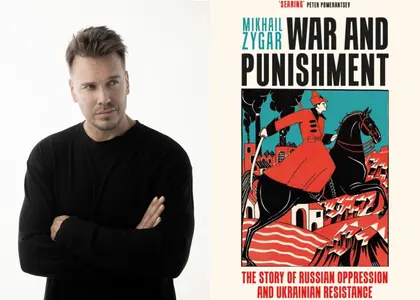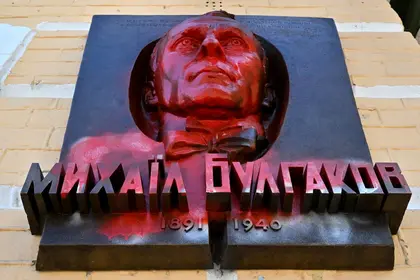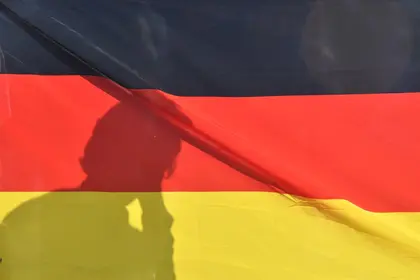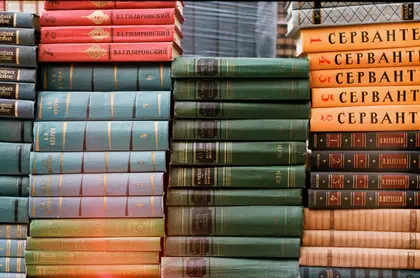Okay, the year is coming to an end. And what are my favorite reads from the year that’s ending? What do I recommend?
As the chief editor of Kyiv Post, I’m not going to go into my own personal preferences as to fiction and nonfiction not related to Ukraine. I’ll stick to the subject at hand – that is, those books that during 2023 dealt with Ukraine directly.
JOIN US ON TELEGRAM
Follow our coverage of the war on the @Kyivpost_official.
Fortunately, since Russia launched its full-scale war against Ukraine there have been many of them.
Let me mention but a few of the more outstanding ones.
2022 brough us the first responses to Russia’s barbaric war against Ukraine, with such commendable books as: Luke Harding’s Invasion, and Olga Onuch’s and Henry E. Hale’s The Zelensky Factor..
There were also Kalani Pilckhart’s I Will Die in a Foreign Land, and Iuliia Mendel’s The Fight of Our Lives: My Time With Zelenskyy, Ukraine’s Battle for Democracy, and What It Means for the World. She was his press secretary from 2019 to 2021.
2023 saw the appearance of Serhii Plokhy’s The Russo-Ukrainian War, a lucid and masterly account of Russia’s assault on Ukraine in 2014 and what led up to it, going up to 2023. A must read.
In France, Eugene Berg’s capably set the scene for French readers with his Ukraine. Fevrier 2023.
But for me, the most unexpected and gratifying read this year was Mikhail Zygar’s War and Punishment.
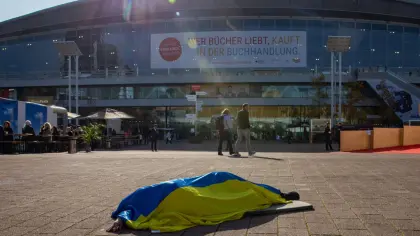
17-Hr Bus Ride No Barrier For Ukrainians at Frankfurt Book Fair
This is an amazing, stimulating, book: the 42-year-old Russian journalist, writer, film maker and founding chief editor of Russia’s celebrated independent TV news channel Dozhd, forced to live in exile, courageously atoning before Ukrainians. He tries very honestly to set the historical record of Russian-Ukrainian relations straight in his forthright “Story of Russian Oppression and Ukrainian Resistance.”
Zygar begins his tome with a bombshell. “This book is a confession,” he writes. “I am guilty for not reading the signs much earlier. I, too, am responsible for Russia’s war against Ukraine. As are my contemporaries and our forebears. Regrettably, Russian culture is also to blame for making all these horrors possible.”
The book is also a must read, not only for Russians, but Ukrainians as well, not to mention naïve Western Russophiles.
Just listen to what illustrious reviewers say.
Oliver Bullough: “Zygar demolishes Putin’s myths about Ukraine with a fury born out of shame at what is being done in his country’s name. It is just possible to dream that, one day, War and Punishment will be taught in Russian schools in place of the Kremlin’s deadly lies.”
Serhii Plohky: “Zygar invites us to walk an uneasy path of reconsideration of the recent past. His book is not only a guide to that past but also a powerful call to change the present.”
Christine Amanpour: “Knowing he could always follow many colleagues and activists into jail, hospital or into the graveyard, Zygar persists.”
The author is a well-informed and well-connected dissident Russian journalist. Much of what he writes needs to be known by the Russian public, but also appreciated by Ukrainian readers not accustomed to writing and revelations of this sort.
His approach is direct, perceptive and apt, and in the end constructively provocative. Ukrainian and Western readers will gain a lot from his thoughtful and refreshing insights and tidbits of insider information accumulated when he was a roving correspondent.
There is plenty of stuff about what actually went on behind the scenes during Ukraine’s first three decades of independence, under presidents Kravchuk, Kuchma, Yushchenko, Yanukovych and Poroshenko, much of it murky. If you want to know who encouraged Zelensky to go into politics, you can also find out here.
Some minor factual blemishes do not detract from the overall contribution of this still rare, but very timely, call from the Russian side for honesty in reviewing Ukrainian-Russian relations from a historical perspective and hopefully, one day, learning to live alongside one another respectfully.
With regards to his Russian compatriots, Zygar admits that “many are still drugged up, intoxicated by the grandeur of imperialism.”
For instance, Mikhail Gorbachev, whom Zygar interviewed many times, “after his presidency…largely reinvented his biography, forgetting that he was once perceived as a Soviet dictator.” His wife Raisa was Ukrainian, and he himself was half Ukrainian on his mother’s side. But “he always struggled to see Ukraine as a separate country.”
Zygar concludes: “Imperial history is our disease; it’s inherently addictive. And the withdrawal symptoms will hurt. But this is inevitable. We have to return to reality and realize what we’ve done.”
You can also highlight the text and press Ctrl + Enter


